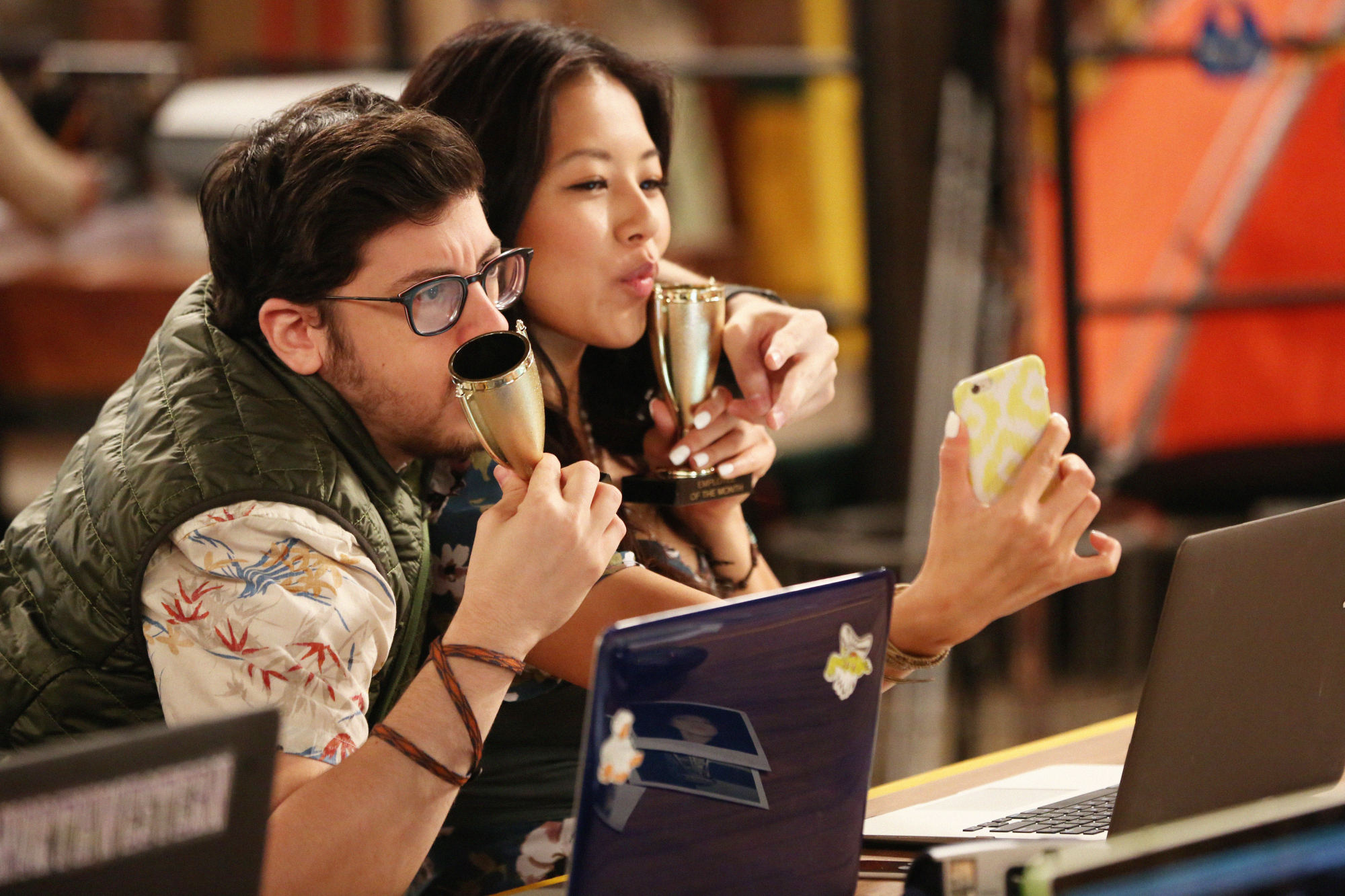Why TV loves to hate millennials
It's eerily similar to how TV once treated Generation X


A free daily email with the biggest news stories of the day – and the best features from TheWeek.com
You are now subscribed
Your newsletter sign-up was successful
Twenty-five years ago, in 1991, the children of the Baby Boomers had their first proper introduction into popular culture. Douglas Coupland's novel Generation X: Tales for an Accelerated Culture gave the group a name, and described lives tinged with cynicism and rootlessness. Richard Linklater's film Slacker valorized a DIY ethos, divorced from conventional social productivity. Nirvana's snarky, angry album Nevermind put a frame around the generation's attitude, best expressed in the line, "Here we are now. Entertain us." This was the dominant image of Gen-X in the '90s: pop-culture-obsessed, irony-addled, and struggling with grown-up responsibilities. Largely untouched by war or widespread economic hardship, the young Americans who'd grown up in the '70s and '80s seemed smarter and more plugged in than their parents or grandparents, but also completely at sea when it came to finding a job or paying bills.
Fast-forward to September of 2016, and CBS's reality competition hit Survivor begins airing one of its occasional gimmick seasons: "Millennials vs. Gen-X." As with previous Survivor experiments (like "Brains vs. Brawn vs. Beauty" or "Blue Collar vs. White Collar vs. No Collar"), the producers go all-in on casting and positioning the teams to reflect stereotypes. The millennials describe themselves as deeply into video games, unimpressed with authority figures, and not especially interested in committing to either relationships or jobs.
And Generation X? According to host Jeff Probst — and to the contestants — the men and women who grew up with Game Boys, CD players, 2 Live Crew, and earnest debates over the relative desirability of Gilligan's Island characters are now the exemplars of hard work, moral fortitude, and old-school analog "authenticity." At various points during this season of Survivor, Probst has prompted members of the Gen-X tribe to wax rhapsodic about vinyl records and the pre-texting era, apparently unaware that there's currently a vinyl revival driven by millennials, and that Generation X has been communicating with each other digitally for most of their adult lives. Anyone over 40 on TV is now some great mass of "normal," readily contrastable with the fresh-faced 20-year-old aliens who walk among us.
The Week
Escape your echo chamber. Get the facts behind the news, plus analysis from multiple perspectives.

Sign up for The Week's Free Newsletters
From our morning news briefing to a weekly Good News Newsletter, get the best of The Week delivered directly to your inbox.
From our morning news briefing to a weekly Good News Newsletter, get the best of The Week delivered directly to your inbox.
Survivor's explication of the differences between generations isn't entirely wrong. But it does feel forced, and divorced from both history and reality — as did, honestly, the popular understanding of Gen-Xers back when they were the lazy, clueless young people who had older folks worried about the country's future.
Or perhaps I should say "we," not "they." Full disclosure: I was born in 1970, and at various points in my life I would've fit any clichéd depiction of my generation that you prefer. I sported a goatee and a flannel shirt in my 20s, and spent much of my time watching old TV shows and spending my money on alternative rock and rap, even as my credit rating went up in flames. But in the '90s I also went through stretches where I held four jobs simultaneously. Back then I would've been Survivor's idealized Gen-X-er: pulling myself up by any bootstrap I could find.
At no point in my life however have I identified with the character that Joel McHale plays on another CBS show this fall, the freshman sitcom The Great Indoors. The premise of the series is a good one, relevant to today. McHale plays Jack Gordon, a rugged veteran field reporter who gets reassigned to manage his magazine's digital operation and its staff of goofy millennials, after the publication eliminates its print edition. Based on the early episodes provided to critics, The Great Indoors has no intention of generating stinging comedy from the evolving American institution of journalism. Instead, it tries to get laughs from the surly Jack's bafflement at his underlings, who take offense at everything, keep their eyes glued to their cell phones, and aren't big on being told what to do. As someone who's worked in the media for over 20 years — alongside writers, editors, salespeople, and tech experts of all ages — I recognize very little in this show's vision of modern publishing and generational divides.
CBS isn't the only media company that's suddenly discovered "the youngs." Over the past couple of years, Saturday Night Live has struggled with over-generalization every time the writers have tried to put together a sketch making fun of millennials. (The show's done much better when it's let one of those 20-somethings, Pete Davidson, make jokes about his actual life on Weekend Update.) Television commercials have taken on the strawman scourge of millennial entitlement, exemplified by the idea that these kids has been raised to expect "participation trophies." (For the record: My own children, age 11 and 15, have never received a participation trophy; I, however, used to get them all the time when I was in elementary school in the '70s.) And nearly every day, some new demographic study arrives either to confirm or debunk the conventional wisdom about the rising generation. (Millennials are either promiscuous Tinder addicts or they hardly ever have sex. They either can't stand Hillary Clinton or they're fervently #withher!)
A free daily email with the biggest news stories of the day – and the best features from TheWeek.com
Here's what's odd about mainstream pop culture's recent outbreak of Millennial Panic: For one thing, television needs high schoolers, college kids, and young professionals to watch. The fragmenting and deteriorating audience has become a real problem for the industry; and it's not much help when the content generators default to mocking the concerns of the generation whose eyeballs are most in demand. Why would any 22-year-old watch The Great Indoors, when the ladies of Broad City are much savvier and funnier about what it's like to be their age in the 2010s?
What's also strange about Survivor, The Great Indoors, and other attempts to define (and scorn) millennials on screen is that the members of that generation have been on TV all along, without much comment or sneering. Do you know who won the previous season of Survivor? Michele Fitzgerald, at age 24. Two of the most popular television actors right now are The Flash's Grant Gustin, age 26, and Supergirl's Melissa Benoist, age 28. Americans can't get enough of NBC's The Voice, with this season's new judges Alicia Keys (35) and Miley Cyrus (23). Show business, as it always has, feeds on the young.
The problem is that movies and television have also always had a hard time defining what that youth actually means in the here and now. The Flash isn't really about being 26. The show's writers have made very little attempt to flesh out their hero via the kind of popular culture he consumes, or by how he feels about dating apps. Survivor never tried to define Michele Fitzgerald by her generation either; instead, because she was on the "Beauty" tribe, her pre-assigned shtick had more to do with being attractive and underestimated.
The American entertainment industry prefers broadness to nuance. Television in particular likes buzzwords, strong attitudes, and characters that viewers can immediately "get." That's why, long after most of us have integrated cell phones into our daily lives, Hollywood still uses the cliché of the phone-wielding business executive as a shorthand for "inhumane." It's rare to get a show like The Good Wife, where characters from different generations were equally up to speed on our current world of web surfing, binge watching, and file sharing. More often, TV is still generating protagonists who listen to '70s classic rock and love early '80s blockbusters, even if they were born in 1985.
Ultimately, no generation is easily reducible to a few traits, because we're all split between the part of ourselves that engages with popular culture, and the part that follows the same social path as our parents: going to school, getting married, having kids, seeking spiritual fulfillment, and so on. Not every 20-year-old in 1968 was a hippie per se, even if they listened to Jefferson Airplane. Not every 20-year-old in 2016 is what TV derides as a "millennial," even if they have ironic facial hair and occasionally eat artisanal breakfast cereal. It's great that the media wants to engage with a newer audience, because that's how our entertainment stays fresh. But it'd feel even fresher if we could hear these youngsters' actual voices, and not what their skeptical elders imagine them to be.
Noel Murray is a freelance writer, living in Arkansas with his wife and two kids. He was one of the co-founders of the late, lamented movie/culture website The Dissolve, and his articles about film, TV, music, and comics currently appear regularly in The A.V. Club, Rolling Stone, Vulture, The Los Angeles Times, and The New York Times.
